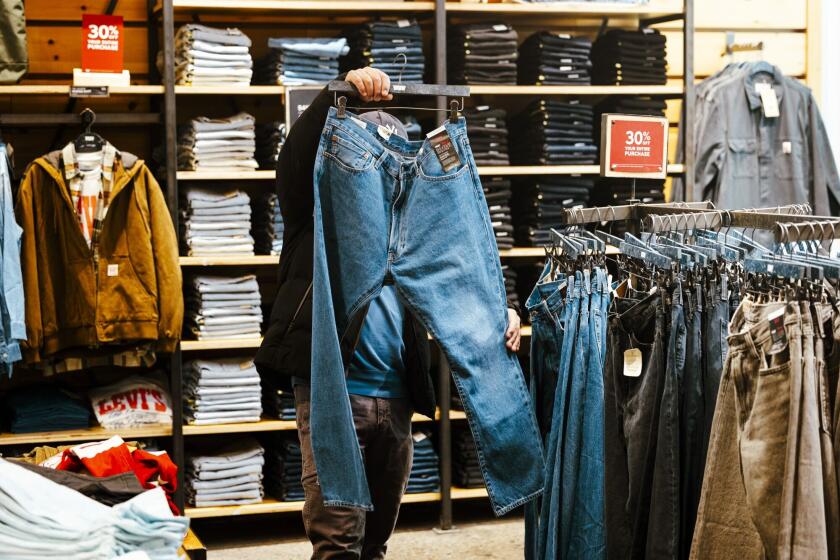Why Kroger is closing 60 stores: ‘One hit after another’

- Share via
After a series of setbacks, Kroger’s recent decision to close 60 locations nationwide is the latest sign of distress for the grocer that operates more than 300 stores in California.
Kroger, the parent company of Ralphs and Food 4 Less, is reducing its footprint after the resignation of its chief executive and a failed merger with competing grocery giant Albertsons. The company faces a lawsuit related to the merger and also has been struggling with labor unrest.
Employees had been threatening to strike until the company reached a tentative agreement with the United Food and Commercial Workers union this week.
Based in Cincinnati, Kroger also owns Harris Teeter, King Soopers and Dillons. The company operates more than 2,700 stores under different brands across the country and offers fresh goods, some household items and pharmacy services.
Kroger, which owns California grocery chains Ralphs and Food 4 Less, will close 60 locations over the next 18 months.
“Instead of popping champagne and toasting to their merger, Kroger is instead just enduring one hit after another,” said Jeff Wells, lead editor at the trade publication Grocery Dive. “They’re still a pretty stable business, but they’re facing a lot in terms of challenges.”
Impending closures
Kroger announced late last month in its quarterly earnings report that it plans to close 60 stores over the next 18 months. The company did not disclose which locations would be shut down.
“We’re simplifying our business and reviewing areas that will not be meaningful to our future growth,” interim Chief Executive Ronald Sargent said in an earnings call. “Today, not all of our stores are delivering the sustainable results we need.”
Kroger temporarily paused routine store closures while the Albertsons merger was pending, Sargent said. The company normally closes about 30 stores per year, Melius Research analyst Jacob Aiken-Phillips said.
The company is on track to complete 30 major store projects this year and expects to accelerate store openings in 2026, Sargent said on the earnings call.
Competitive market
Kroger is under increasing pressure from competitors, experts said, some of which offer a wider range of items and convenient one-stop shops.
“Kroger faces this intensely competitive field in the grocery industry,” Wells said. “From Walmart to Costco to Whole Foods and Sprouts Farmers Market, everybody in the industry is kind of gunning for them.”
The Albertsons merger would have given Kroger the scale to compete with giants such as Walmart and Amazon, Aiken-Phillips said.
“After the merger failed, they had to reexamine their strategy and focus on how they can grow and compete without that scale,” he said. “That’s the major challenge right now.”
Albertsons says it is giving up on joining forces with Kroger and has filed a lawsuit, accusing the chain of failing to do enough to win government approval for the deal.
Kroger relies on pharmacy services, advertising and e-commerce for additional revenue, experts said. Although the company grew its e-commerce business 15% in the first quarter of this year, the business remains unprofitable.
A chief executive shuffle
Former Kroger CEO Rodney McMullen stepped down in March after an investigation into his personal conduct, the company announced. Sargent was appointed chairman of the board of directors and interim CEO.
Kroger did not share details of the investigation into McMullen. His “personal conduct, while unrelated to the business, was inconsistent with Kroger’s Policy on Business Ethics,” the company’s statement said.
“When he resigned, it threw a wrench in progressing the company because now you need a new leader to come in,” Aiken-Phillips said.
A failed merger
In 2022, Kroger agreed to buy Albertsons for $24.6 billion, a sale that would have been the largest supermarket merger in U.S. history.
The Federal Trade Commission, California and several other states sued to stop the merger, arguing that it would hobble competition in many parts of the country, leaving customers at the mercy of a newly formed behemoth and driving up prices. Kroger and Albertsons collectively own about 5,000 grocery stores.
A federal judge on Tuesday temporarily blocked what would be the largest supermarket merger in U.S. history, involving Kroger and Albertsons.
In late 2024, Albertsons scrapped the deal after a federal judge in Oregon issued a preliminary injunction in the case. The high-stakes court battle centered on concerns that the megamerger would add to the financial woes of consumers who have grappled with the rising cost of food.
Albertsons also sued Kroger, claiming that the grocer didn’t do enough to win over regulators. Kroger has since countersued.
Ongoing labor unrest
In June, grocery workers at Albertsons and Kroger — numbering about 45,000 — voted to authorize a strike to protest what they called unfair labor practices. A walkout would have caused a major disruption for two of the nation’s largest grocery chains during the busiest season of the year.
The United Food and Commercial Workers union announced Thursday that it reached a tentative agreement with the two companies that would allow them to avoid a strike. The union will vote on whether to approve the agreement July 9-11.
“Following an intense 40 plus hour bargaining session that began on Friday morning, we’ve secured an agreement that addresses our priorities,” the union said in a statement.
The agreement includes higher wages, improved pension plans as well as health and welfare improvements, the union said. Kroger did not respond to requests for comment.
More to Read
Inside the business of entertainment
The Wide Shot brings you news, analysis and insights on everything from streaming wars to production — and what it all means for the future.
You may occasionally receive promotional content from the Los Angeles Times.














